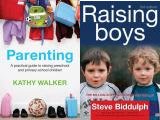 Before I became a father, I was conceited enough to believe that I could come up with all the answers to effective parenting myself. Without going into great detail – perhaps I shall elaborate in a future post – I realized one day that my approach to parenting required urgent reconstruction. Since then, I have worked hard to be a better father; reading these books was a significant part of that process.
Before I became a father, I was conceited enough to believe that I could come up with all the answers to effective parenting myself. Without going into great detail – perhaps I shall elaborate in a future post – I realized one day that my approach to parenting required urgent reconstruction. Since then, I have worked hard to be a better father; reading these books was a significant part of that process.
Parenting: a practical guide to raising preschool and primary-school children by Kathy Walker outlines specific strategies to teach children about the principles of good behavior rather than apparently arbitrary rules. The idea is to credit even very young children with the ability to reflect on behaviors and consequences, thus de-emphasising guilt and blame. In particular, Walker disputes the effectiveness of time-out, stating that parents often resort to it out of frustration, while children often fail to learn the intended lesson. I concede that the technique is ineffective if implemented incorrectly, my wife and I remained keen proponents of time-out (although used very rarely these days!), and I think that it can be incorporated within the positive discipline model espoused in this book. I found that I was able to put the suggestions into practice right away and engage in a more thoughtful and constructive dialogue with my children.
Raising Boys: why boys are different and how to help them become happy and well-balanced men by Steve Biddulph discusses how boys of all ages rely on male role models to develop healthy attitudes and relationships. Biddulph puts the onus on the father to ensure that his son can curb aggressive tendencies, respects women and is comfortable with intimacy and sexuality. Furthermore, he argues that “quality time” is a myth and that fathers need to spend more time with their sons in order to achieve these priorities. For me, the most confronting aspect of his book is his contention that men working 55 hours a week or more (including the commute) cannot be adequate fathers. As a career-minded professional, I am aware that work and family life are in conflict to some extent; but I am not ready to accept that the line must be drawn where Biddulph suggests. That said, after reading this book, I resolved to spend a greater portion of my leisure time with my children rather than on individual pursuits.
I gained from these books several new ideas on short-term parenting strategies, but also a sense of how these relate to a longer-term perspective on parenting. In thinking more deeply about the values I would like my children to have as adults, I have a clearer idea of how I can exert a positive influence in this direction, starting now. Although these are Australian books, I believe their messages are equally relevant in other Western societies (although I suspect that Kathy Walker’s book is harder to find in the U.S. market).



